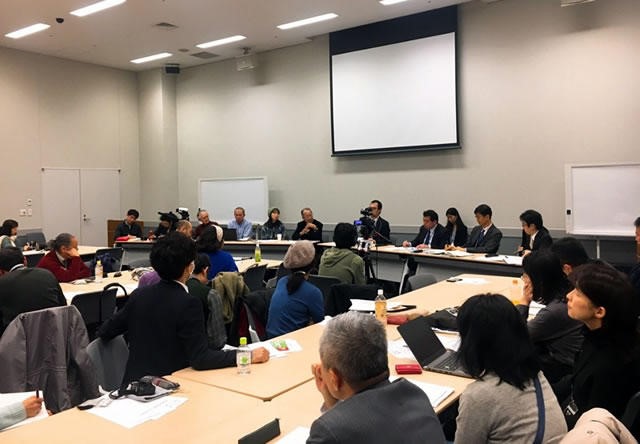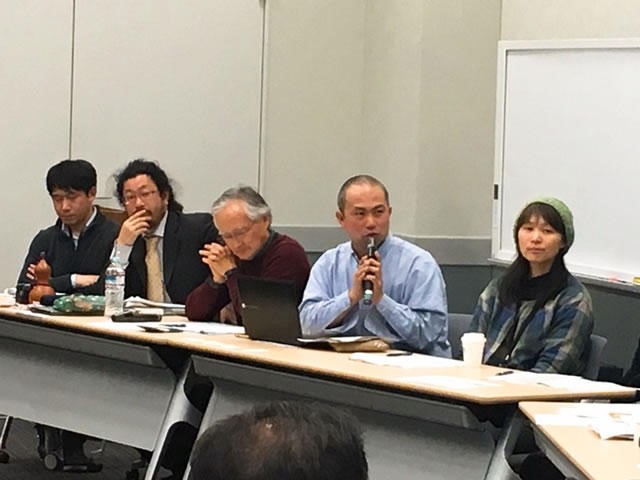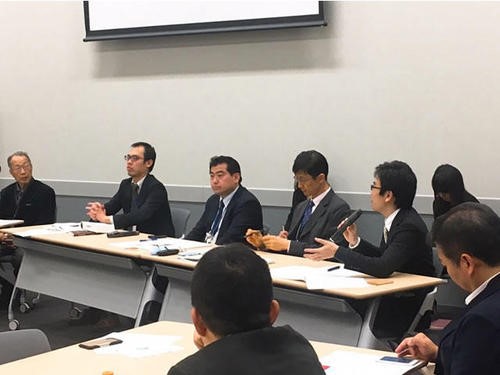[Original by Risa FUJII, 2018 Public Relations Intern (March 14, 2019); Translated by M. Kanai]
Good afternoon. My name is Fujii. I am a JVC’s public relations intern for fiscal year 2018. Today, I would like to report on a meeting which was held on February 18, 2019 to discuss the UN Declaration on the Rights of Peasants and Other People Working in Rural Areas and the UN Decade of Family Farming 2019-2028 in a venue set in the Diet Members’ Office Building. The meeting was attended by farmers, academics/researchers, government officials, and civic groups.
Let me briefly explain the UN Declaration on the Rights of Peasants and Other People Working in Rural Areas and the UN Decade of Family Farming 2019-2028, which are the key words of the agenda for the meeting.
The UN Declaration on the Rights of Peasants and Other People Working in Rural Areas
In December 2018, the UN General Assembly adopted the Declaration on the Rights of Peasants and Other People Working in Rural Areas (Hereinafter called the Declaration on the Rights of Peasants). The Declaration which re-appraised the value and roles of peasants was adopted with 121 in favor, 8 against, and 54 abstentions. Agrarian developing countries and other developing countries voted in favor of the idea and developed countries that are willing to promote large-scale farming voted against it. Japan abstained from voting.
The UN Decade of Family Farming 2019-2028
Originally, family farming is a means of organizing agricultural production which is mostly managed and operated by a family. Today, family farmers provide approximately 80 percent of the world’s food consequently playing a very important role in the production of the world’s food. However, as large-scale agricultural production gains pace in recent years, livelihood of smallholder family farmers has become threatened. Given this situation, the United Nations, in 2014, defined the year 2014 as the International Year of Family Farming thereby re-acknowledging the significance of family farming and furthermore officially declared the ten-year period starting in 2019 the Decade of Family Farming.
With the adoption of the UN declaration and the start of the Decade of Family Farming this year, momentum is rising in every corner of the world to re-evaluate the significance of smallholder farming. The meeting on February 18 in the Diet Members’ Office Building was held with a purpose to encourage the government to come up with a renewed political commitment to smallholder farmers who have played a central part in developing agricultural communities of Japan on this very occasion when smallholder farmers and family farming have finally come under the spotlight across the globe.
Introduction of the problems surrounding Japan’s agriculture today and actions taken by farmers and farmers’ groups

The venue was filled with farmers and researchers/students who specialize in agriculture and other concerned parties.
In the first part of the session, those people who are engaged in farming presented their issues and the efforts they are making respectively. What every presenter mentioned in common was the importance of family farming. Large-scale farming currently in progress seems to make sense in terms of anticipated productivity and profitability. However, there are two aspects in agriculture. One aspect is that of industry. The other is that agriculture plays a role of creating a foundation for living and livelihood of farmers where strong ties in the community and among families are formed. It was reiterated in the presentations that agricultural and development projects need to be carried out taking into consideration the actual situation of farming in respective areas concerned. Otherwise, something important that has intangible values and cannot be replaced with money will be lost.
Dialogue with government officials
In the second part of the session, officials of the Ministry of Foreign Affairs and the Ministry of Agriculture, Forestry and Fisheries were invited to take part in the panel discussion.

Panelists: farmers, academic leaders, and specialists. They talked about the actual situations of farmers in Japan and the importance of the UN Declaration on the Rights of Peasants.
The major point of argument was the voting behavior of the Japanese Government over the UN Declaration on the Rights of Peasants. Japanese Government abstained from voting on the adoption of the resolution. Why Japan did not vote? A foreign ministry official explained that there were mainly two reasons. Firstly, argument at the UN General Assembly on the declaration had not yet reached conclusion and it was premature to form a consensus. Secondly, the government’s understanding was that there was no need for a new instrument intended specifically for peasants who were to be protected within the framework of existing human rights treaties.
In addition, foreign ministry in its explanation emphasized that this declaration being resolution of the UN General Assembly has no legal binding force with no obligation to comply with. Incidentally, the ministry did also mention that the Japanese government was ready to respect the declaration although it was a non-binding resolution. There were a lot of criticism from the floor against the government’s reluctance to comply with the resolution under the excuse of its non-binding nature.

Panelists: officials of the Ministry of Foreign Affairs and the Ministry of Agriculture, Forestry and Fisheries. They explained the government’s views on the UN Declaration on the Rights of Peasants.
An agricultural ministry official said that the ministry wants to know more in detail about the problems faced by farmers. In response, farmers’ groups proposed to provide the ministry with a list of such problems. The both parties agreed to promote this kind of dialogue and communication for mutual understanding.
My comments
Japanese farmers are currently faced by a multitude of problems: difficulty of making a living through farming alone, lack of successors, impact of global warming on agricultural production, and so on. Amid such difficulties, re-evaluation of smallholder farmers and family farming presently underway throughout the world seemed to give rays of hope to the farmers. At the same time, however, farmers appeared feeling apprehensive and indignant about the fact that Japan abstained from voting and that during the meeting, the foreign ministry repeatedly emphasized non-binding nature of the declaration.
In my view, protection of the rights of smallholder farmers and sustaining family farming do not necessarily run counter to the move towards large-scale farming. Agriculture as an industry where the scale of farming is expanded seeking after profitability and efficiency can develop itself without affecting agriculture for living where farmers preserve natural environment and form a community. We need to deeply think over as to how the both aspects of the agriculture can be developed achieving a balance between the two.
Agriculture has a direct bearing on food which is necessary for us to sustain our lives. For this reason, the declaration and other relevant issues should not be dealt with only in the context of agriculture. Farmers and the government will continue their dialogue. We will keep watching the progress.
Share This: